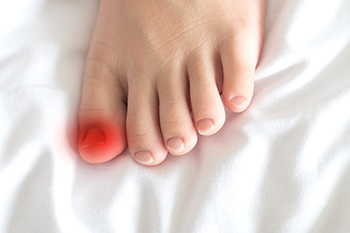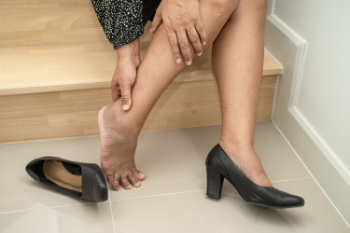Items filtered by date: November 2024
Symptoms and Treatments for Ingrown Toenails

An ingrown toenail occurs when the edge of the nail grows into the surrounding skin, causing pain, swelling, and sometimes infection. This common condition typically affects the big toe and is often caused by improper nail trimming, wearing tight shoes, or injury. Symptoms include redness, tenderness, and in some cases, pus or drainage if an infection develops. Relief for ingrown toenails often starts with soaking the foot and wearing looser shoes. In mild cases, a podiatrist may gently lift the nail or trim it to relieve pressure. If the condition is severe or infected, more advanced treatments, such as removing part of the nail or prescribing antibiotics, may be necessary. A podiatrist can diagnose the severity of the ingrown toenail and recommend the best treatment options. If you are experiencing pain or discomfort from an ingrown toenail, it is suggested that you schedule an appointment with a podiatrist for professional care and relief.
Ingrown toenails can become painful if they are not treated properly. For more information about ingrown toenails, contact Theresa Brown, DPM of Essie M.B. Smith Foot Clinic. Our doctor can provide the care you need to keep you pain-free and on your feet.
Ingrown Toenails
Ingrown toenails occur when a toenail grows sideways into the bed of the nail, causing pain, swelling, and possibly infection.
Causes
- Bacterial infections
- Improper nail cutting such as cutting it too short or not straight across
- Trauma to the toe, such as stubbing, which causes the nail to grow back irregularly
- Ill-fitting shoes that bunch the toes too close together
- Genetic predisposition
Prevention
Because ingrown toenails are not something found outside of shoe-wearing cultures, going barefoot as often as possible will decrease the likeliness of developing ingrown toenails. Wearing proper fitting shoes and using proper cutting techniques will also help decrease your risk of developing ingrown toenails.
Treatment
Ingrown toenails are a very treatable foot condition. In minor cases, soaking the affected area in salt or antibacterial soaps will not only help with the ingrown nail itself, but also help prevent any infections from occurring. In more severe cases, surgery is an option. In either case, speaking to your podiatrist about this condition will help you get a better understanding of specific treatment options that are right for you.
If you have any questions please feel free to contact our office located in Montgomery, AL . We offer the newest diagnostic and treatment technologies for all your foot and ankle needs.
Cold Feet May Indicate Poor Circulation

Cold feet can be a bothersome sensation, often signaling underlying health issues. One of the primary causes is poor circulation, which may stem from conditions such as peripheral artery disease or diabetes. When blood flow is restricted, the extremities do not receive adequate warmth, leading to a chilling effect in the feet. Other factors contributing to cold feet include anemia, which reduces oxygen supply to tissues, and neuropathy, where nerve damage alters sensation. Environmental factors, such as exposure to cold temperatures, can also play a significant role. Lifestyle choices, including smoking and lack of physical activity, may further cause circulation issues. If you consistently have cold feet, it is suggested that you consult a podiatrist who can determine if poor circulation is the cause, and offer effective relief and treatment methods.
While poor circulation itself isn’t a condition; it is a symptom of another underlying health condition you may have. If you have any concerns with poor circulation in your feet contact Theresa Brown, DPM of Essie M.B. Smith Foot Clinic. Our doctor will treat your foot and ankle needs.
Poor Circulation in the Feet
Peripheral artery disease (PAD) can potentially lead to poor circulation in the lower extremities. PAD is a condition that causes the blood vessels and arteries to narrow. In a linked condition called atherosclerosis, the arteries stiffen up due to a buildup of plaque in the arteries and blood vessels. These two conditions can cause a decrease in the amount of blood that flows to your extremities, therefore resulting in pain.
Symptoms
Some of the most common symptoms of poor circulation are:
- Numbness
- Tingling
- Throbbing or stinging pain in limbs
- Pain
- Muscle Cramps
Treatment for poor circulation often depends on the underlying condition that causes it. Methods for treatment may include insulin for diabetes, special exercise programs, surgery for varicose veins, or compression socks for swollen legs.
As always, see a podiatrist as he or she will assist in finding a regimen that suits you. A podiatrist can also prescribe you any needed medication.
If you have any questions, please feel free to contact our office located in Montgomery, AL . We offer the newest diagnostic and treatment technologies for all your foot care needs.
Understanding Gout in the Heel

Gout is a type of inflammatory arthritis that can cause intense pain and discomfort, often affecting the heel. This condition arises when uric acid levels in the blood become elevated, leading to the formation of sharp crystals in the joints. Symptoms of gout in the heel typically include sudden, severe pain, swelling, and redness in the affected area. The pain may be most intense during the night or early morning, making it difficult to walk or put weight on the heel. Several factors can contribute to the development of gout, including a diet high in purines found in red meats, shellfish, and alcoholic beverages. Other risk factors include obesity, certain medical conditions, and genetic predisposition. If you have heel pain, it is suggested that you consult a podiatrist who can accurately diagnose gout in the heel, and offer you effective relief and treatment solutions.
Gout is a painful condition that can be treated. If you are seeking treatment, contact Theresa Brown, DPM from Essie M.B. Smith Foot Clinic. Our doctor will treat your foot and ankle needs.
What Is Gout?
Gout is a form of arthritis that is characterized by sudden, severe attacks of pain, redness, and tenderness in the joints. The condition usually affects the joint at the base of the big toe. A gout attack can occur at any random time, such as the middle of the night while you are asleep.
Symptoms
- Intense Joint Pain - Usually around the large joint of your big toe, and it most severe within the first four to twelve hours
- Lingering Discomfort - Joint discomfort may last from a few days to a few weeks
- Inflammation and Redness -Affected joints may become swollen, tender, warm and red
- Limited Range of Motion - May experience a decrease in joint mobility
Risk Factors
- Genetics - If family members have gout, you’re more likely to have it
- Medications - Diuretic medications can raise uric acid levels
- Gender/Age - Gout is more common in men until the age of 60. It is believed that estrogen protects women until that point
- Diet - Eating red meat and shellfish increases your risk
- Alcohol - Having more than two alcoholic drinks per day increases your risk
- Obesity - Obese people are at a higher risk for gout
Prior to visiting your podiatrist to receive treatment for gout, there are a few things you should do beforehand. If you have gout you should write down your symptoms--including when they started and how often you experience them, important medical information you may have, and any questions you may have. Writing down these three things will help your podiatrist in assessing your specific situation so that he or she may provide the best route of treatment for you.
If you have any questions, please feel free to contact our office located in Montgomery, AL . We offer the newest diagnostic and treatment technologies for all your foot care needs.
Heel Pain Can Be Treated!
Causes of Nerve Pain in the Foot

Nerve pain in the foot can arise from various conditions, each presenting unique symptoms. Morton’s neuroma occurs when a nerve between the toes becomes compressed, causing sharp, burning pain and numbness in the ball of the foot. Tarsal tunnel syndrome results from compression of the tibial nerve as it passes through the tarsal tunnel, leading to tingling and pain in the arch and heel. Sciatica, often originating from issues in the lower back, can cause radiating pain down the leg into the foot. Additionally, diabetic neuropathy, a common complication of diabetes, can lead to numbness, tingling, and pain due to nerve damage. If you have foot pain or any of the above symptoms, it is suggested that you consult a podiatrist who can offer you effective treatment solutions.
Foot Pain
Foot pain can be extremely painful and debilitating. If you have a foot pain, consult with Theresa Brown, DPM from Essie M.B. Smith Foot Clinic. Our doctor will assess your condition and provide you with quality foot and ankle treatment.
Causes
Foot pain is a very broad condition that could be caused by one or more ailments. The most common include:
- Bunions
- Hammertoes
- Plantar Fasciitis
- Bone Spurs
- Corns
- Tarsal Tunnel Syndrome
- Ingrown Toenails
- Arthritis (such as Gout, Rheumatoid, and Osteoarthritis)
- Flat Feet
- Injury (from stress fractures, broken toe, foot, ankle, Achilles tendon ruptures, and sprains)
- And more
Diagnosis
To figure out the cause of foot pain, podiatrists utilize several different methods. This can range from simple visual inspections and sensation tests to X-rays and MRI scans. Prior medical history, family medical history, and any recent physical traumatic events will all be taken into consideration for a proper diagnosis.
Treatment
Treatment depends upon the cause of the foot pain. Whether it is resting, staying off the foot, or having surgery; podiatrists have a number of treatment options available for foot pain.
If you have any questions, please feel free to contact our office located in Montgomery, AL . We offer the newest diagnostic and treatment technologies for all your foot care needs.




